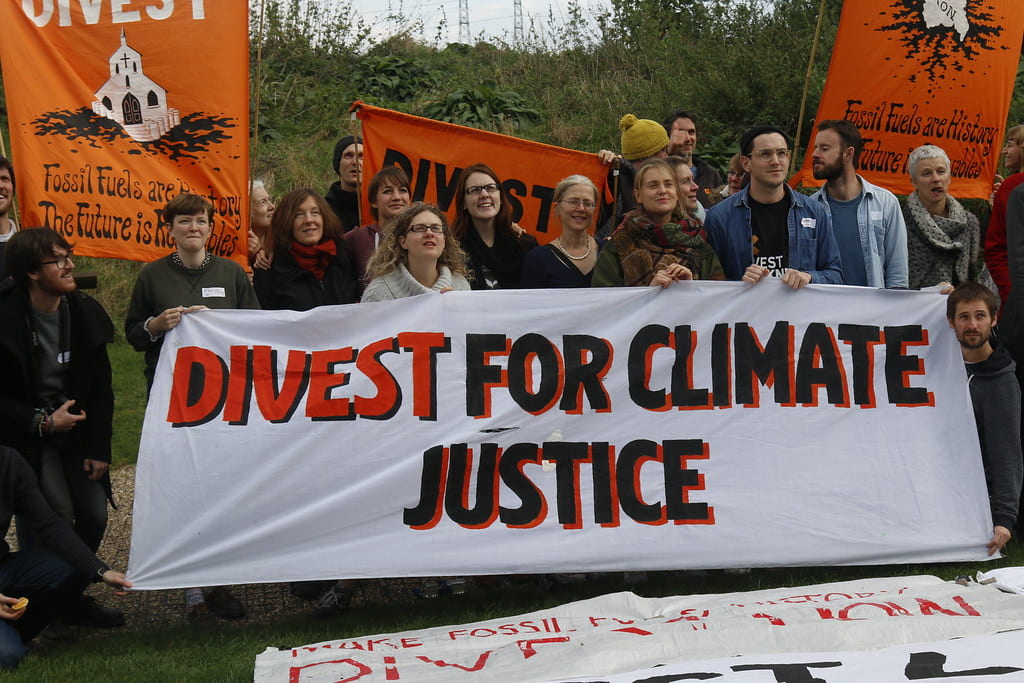Hey guys! Welcome back to my blog!
Over the past ten weeks, I’ve talked about how different stakeholders play a role in mitigating climate change, from big banks to governments. Today I’d like to poetically end off this blog assignment by talking about the role of universities in doing so.

UCL (University College London), one of the top universities in the world, recently announced that it would fully divest from fossil fuels by the end of this year. It also pledged to be carbon zero by 2030, plastic-free by 2024 and vegetarian by 2021. (UCL, last accessed 1 November 2019) Despite being pleasantly surprised by this piece of news when I first came across it, further research quickly showed me that UCL was in fact one of the last few universities in the UK to divest from fossil fuels. UCL comes at the 77th out of 103 universities in the UK to do so, withdrawing £16 million in fossil fuel shares, notably in Royal Dutch Shell. This hesitation chalked up a conflict of interest among the UCL senior management, as the previous chair of UCL council, who held the position till 1 August 2019, used to occupy high ranking positions in Shell and BP. (UCL, last accessed 2 November 2019)
This seems to reflect a worrying trend amongst the UK’s elite universities, as Cambridge and Oxford also have deep ties with fossil fuel companies. Shell holds annual lectures in Cambridge while BP collaborates with their researchers on hydrocarbon recovery. (Hemery, 2017) It would seem that high ranking universities are some of the slowest to divest in fossil fuels. Is this a coincidence? What do you think?
No doubt, leading universities should serve as trailblazers, paving the way for others to follow. Yet, internal politics and dubious relationships act as impediments to effective change such as the example of UCL and its previous chair, Dame DeAnne Julius.
So what caused this shift in attitudes?
A UCL press release document (last accessed 2 November) highlighted that the university’s decision to divest was “not the result of a shift in approach, but rather the realisation that the university could use the symbolic decision for its own ‘social capital’.” What this emphasises is that it is the changing views of society and pressure from green energy advocates that is the key towards encouraging divestment in universities from fossil fuels. Hence, it must be etched into our minds that each of us remains individually responsible, to stay informed and to champion for what is morally right – to give our future generations a liveable home.
At last, I’ve come to the end of my final post. What started as just homework for my ENV1101 module, turned out to be one of the most enriching assignments I’ve had this semester. As a recurring theme throughout my blog posts, I hope that everyone will heed my message of remaining environmentally conscious and to continue fighting for our earth. In my next four years of university education, I hope to be a part of many changes for the better within and without NUS and sincerely hope that my posts have encouraged you to do the same.
Signing off for the last time,
– Letitia 🙂
References:
- (UCL Divestment Press Release, last accessed 1 November 2019). Retrieved from: https://docs.google.com/document/d/1bIJRkpMYiXFAmldLQkCn6YB2bMkcRGC9T0V003vel_4/edit
- (Rogaly et al., 2018). Retrieved from: https://www.theguardian.com/education/2018/nov/23/universities-leading-climate-research-must-stop-funding-fossil-fuels
- (Hemery, 2017). Retrieved from: https://www.opendemocracy.net/en/opendemocracyuk/pressure-mounts-on-british-universities-to-come-clean-on-fossil-fuel-investments/
- (UCL, last accessed 1 November 2019). Retrieved from: https://www.ucl.ac.uk/news/2019/oct/ucl-divests-fossil-fuels-it-launches-bold-new-sustainability-strategy
- (UCL, last accessed 2 November 2019). Retrieved from: https://www.ucl.ac.uk/news/2014/mar/dame-deanne-julius-appointed-next-chair-ucl-council
- [Image 1]. Retrieved from: http://en.people.cn/n3/2019/0926/c90000-9618499.html
- [Image 2]. Retrieved from: https://beaveronline.co.uk/wp-content/2017/09/divest.jpg

Hey Letitia,
Thank you for sharing this issue. I never knew universities had ties with fossil fuel companies!
On that note, I was curious about how NUS fared when it came to energy sourcing. I found this article about how students petitioned for NUS to divest from fossil fuels, too: https://www.straitstimes.com/lifestyle/millennial-activism-student-group-calls-on-nus-to-divest-from-fossil-fuels
I wonder what we can do about this, as BES Students.
Anyways, I enjoyed reading this heartwarming post, and I love how you concluded it. All the best for the rest of your journey fighting for our earth!
-Evelyn 🙂
Hi Evelyn!
Thanks for reading my post! Just last year, NUS and NTU announced a collaboration with ExxonMobil to set up the creation of an energy centre to enhance energy research, (https://www.exxonmobil.com.sg/News/Newsroom/News-releases/2017/1103_NTU-and-NUS-to-set-up-Singapore-Energy-Centre-in-2019) while ExxonMobil continues to sponsor ExxonMobil Campus Concerts in NUS annually. (https://cfa.nus.edu.sg/explore/programming/exxonmobil-campus-concerts/) Undoubtedly, based on this information alone is evident that NUS is far from divestment.
Like you, I only got to know recently that universities too have a stake in fossil fuels. Therefore, as BES students, we ought to spread awareness about this issue and get more people on board with the idea of divestment. In the article that you provided, the petition held by FFYNC and Stand was met with a low turnout of only 800 signatories. This signifies that many people are still unaware of what divestment is. Besides that, we can also speak out or write in to NUS and express our intolerance for fossil fuels.
Small individual actions matter but the complete divestment from fossil fuels would have a more significant impact on our mother Earth! 🙂
Anyway, I’m glad that you enjoyed reading my post! Let’s make the rest of our four years a fulfilling one as we fight our climate crisis together. ◡̈
Cheers,
Letitia
Hey Letitia!
What an interesting post! I had never really thought that NUS or universities are contributing to fossil fuel usage. Seems pretty ironic that we are studying and advocating about climate change but higher management may not be caring about our efforts…I guess we have our work cut out for us!
Willis
Hi, good information mentioned in this blog, Thanks for sharing this. Savings Plan In Singapore